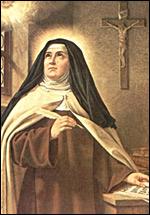 Wednesday of the 28th Week in Ordinary Time
Wednesday of the 28th Week in Ordinary Time
Lk 11:42-46
One day, Satan was admitted into the presence of Jesus.
“How are you, Satan?” the Lord asked him.
“I’m in the best of everything, Jesus. Gaining recruits more than ever!” said Satan. “Have you heard the news?” he asked Jesus.
“What about, Satan?” asked Jesus.
“Well, according to the latest survey, I already have more friends than you do,” replied a proud Satan.
“Are you sure, Satan?” questioned Jesus.
“Can’t be more certain, Jesus” came the reply.
“Very well then, Satan, let’s stroll around the earth and prove me your claim,” challenged Jesus.
And so Satan and Jesus went around the earth. Their first stop was in a marketplace.
“See those vendors who cheat their customers and those customers who cheat the vendors? They are all mine!” Satan told Jesus.
Next they went to a government office.
“You got to be blind not to see the corruption going on here, Jesus. But were you blind, you could even smell there’s something fishy in those deals these public officials are making. All of these crooks and their cronies are mine!” Satan bragged.
The third place they visited was a school.
“This is where they start, Jesus,” said Satan. “They cheat, lie and steal while in school; they will cheat, lie, steal in offices later. These brats are already mine!” Satan said with a loud, horrifying laugh.
Then they entered a house.
“Quiet, peaceful house, huh!” spoofed Satan. “No wonder, Jesus, because there is no one here. Papa is with his mistress. Mama is with her lover. Son is having sex with his girlfriend. Daughter is in an abortion clinic today,” continued Satan. “This is a jackpot, I got the whole family, Jesus!” boasted Satan.
Meanwhile, all throughout their visits, Jesus remained silent and sad. But suddenly, His face beamed and He said, “Satan, let’s go to the nearest church. I know that churches here in the Philippines are always jam packed…especially on Sundays and, like today, Wednesdays.”
Thus, to a nearby church, Jesus and Satan went. They arrived while a Mass was going on. And true enough, the church was bursting with people.
“Look, Satan! Look! Hundreds, no, thousands of people in the Mass! Multiply this by the number of churches in the Philippines; and you will know that I still have more friends than you do,” declared Jesus.
“Take it easy, Jesus. Slow down,” said Satan, see that man at the back, with head bowed down and hands folded in deep prayer?”
“I do. What about him?” asked Jesus.
“He is the corrupt government official we saw awhile ago,” said Satan. “And notice those fruits offered during the offertory? They came from the vendor we saw cheating a customer this morning at the marketplace. The man who is first in line for communion is the same customer who cheated the same vendor. And the members of the choir serving in the Mass are the students in the school we visited,” continued Satan. “You see, Jesus,” Satan went on saying as his hand makes a sweeping move across the church while letting out his trademark laughter, “not because they are here, they are really yours.”



























